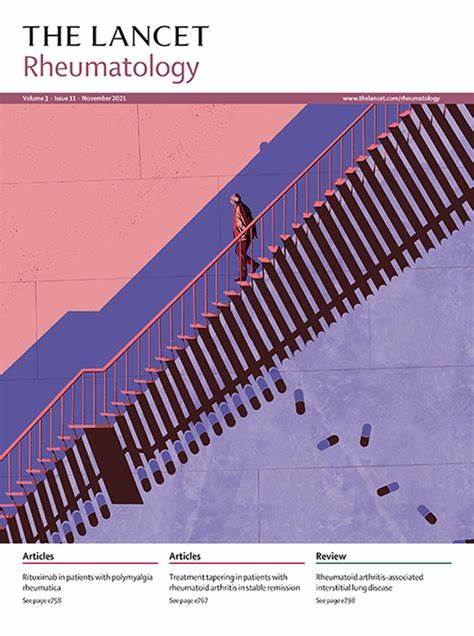Diagnostic, research, and real-life effect of the 2023 EULAR−ACR classification criteria for antiphospholipid syndrome
IF 15
1区 医学
Q1 RHEUMATOLOGY
引用次数: 0
Abstract
The role of classification criteria is particularly important in rheumatic diseases compared with other medical disorders, as the complexity and overlapping symptoms of these conditions make diagnosis challenging. Moreover, the absence of established diagnostic criteria further complicates diagnosing patients. Classification criteria can assist health-care professionals and patients as a diagnostic aid. However, classification criteria are developed for research purposes to standardise populations in clinical trials and observational studies of rheumatic diseases and not for diagnosing patients. Introduction of the 2023 American College of Rheumatology−European Alliance of Associations for Rheumatology (ACR–EULAR) antiphospholipid syndrome classification criteria underscores the important distinction between meeting these criteria and being diagnosed with the condition—a differentiation essential in both clinical practice and research. Although the 2023 ACR–EULAR antiphospholipid syndrome classification criteria improved precision in classification of pregnant individuals with antiphospholipid syndrome, which ultimately should lead to better outcomes and care for these patients, the updated criteria should not be used as diagnostic criteria in routine clinical practice. In this Personal View, we examine the possible effect of the 2023 ACR–EULAR antiphospholipid syndrome classification criteria, with a particular focus on the pregnancy-related aspects of the syndrome.
2023年EULAR-ACR抗磷脂综合征分类标准的诊断、研究和现实影响
与其他内科疾病相比,分类标准在风湿病中的作用尤为重要,因为这些疾病的症状复杂且相互重叠,给诊断带来了挑战。此外,由于缺乏既定的诊断标准,患者的诊断也变得更加复杂。分类标准可以帮助医护人员和患者进行诊断。然而,分类标准是为研究目的而制定的,目的是使风湿病临床试验和观察性研究中的人群标准化,而不是用于诊断患者。2023年美国风湿病学会-欧洲风湿病学协会联盟(ACR-EULAR)抗磷脂综合征分类标准的出台,强调了符合这些标准与被诊断为该病之间的重要区别--这种区别在临床实践和研究中都至关重要。尽管 2023 年 ACR-EULAR 抗磷脂综合征分类标准提高了抗磷脂综合征孕妇分类的准确性,最终应为这些患者带来更好的治疗效果和护理,但更新后的标准不应作为常规临床实践中的诊断标准。在本篇个人观点中,我们将探讨 2023 年 ACR-EULAR 抗磷脂综合征分类标准可能产生的影响,尤其关注该综合征与妊娠相关的方面。
本文章由计算机程序翻译,如有差异,请以英文原文为准。
求助全文
约1分钟内获得全文
求助全文
来源期刊

Lancet Rheumatology
RHEUMATOLOGY-
CiteScore
34.70
自引率
3.10%
发文量
279
期刊介绍:
The Lancet Rheumatology, an independent journal, is dedicated to publishing content relevant to rheumatology specialists worldwide. It focuses on studies that advance clinical practice, challenge existing norms, and advocate for changes in health policy. The journal covers clinical research, particularly clinical trials, expert reviews, and thought-provoking commentary on the diagnosis, classification, management, and prevention of rheumatic diseases, including arthritis, musculoskeletal disorders, connective tissue diseases, and immune system disorders. Additionally, it publishes high-quality translational studies supported by robust clinical data, prioritizing those that identify potential new therapeutic targets, advance precision medicine efforts, or directly contribute to future clinical trials.
With its strong clinical orientation, The Lancet Rheumatology serves as an independent voice for the rheumatology community, advocating strongly for the enhancement of patients' lives affected by rheumatic diseases worldwide.
 求助内容:
求助内容: 应助结果提醒方式:
应助结果提醒方式:


